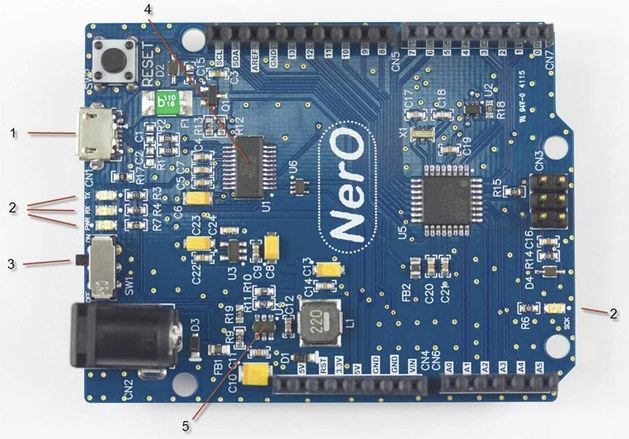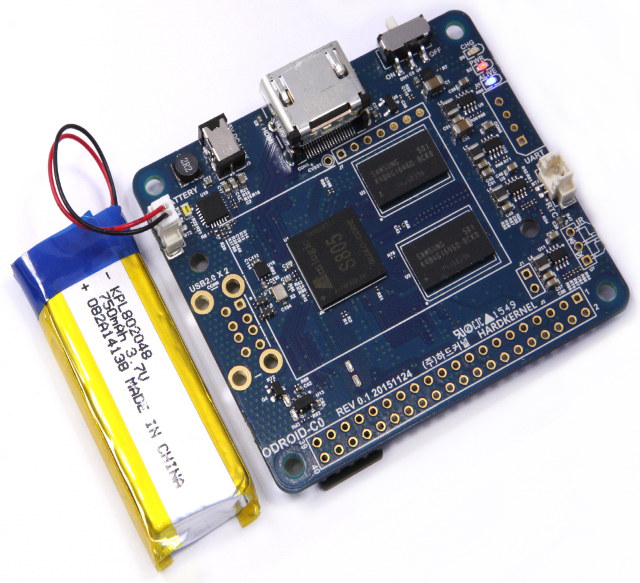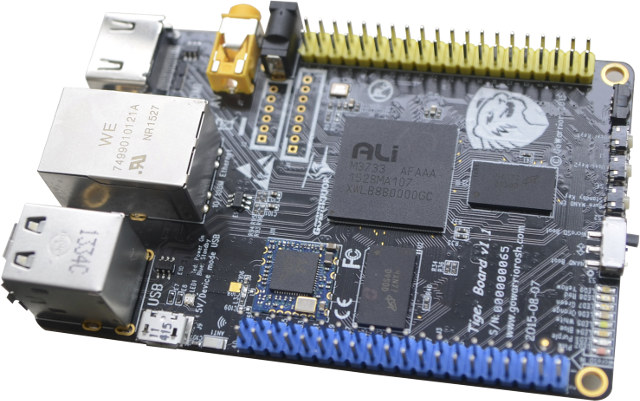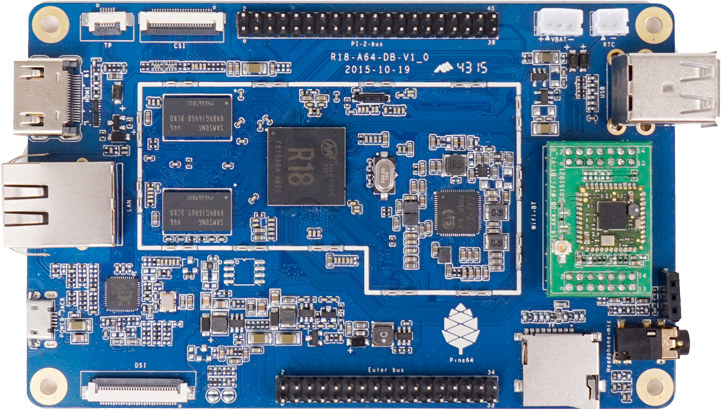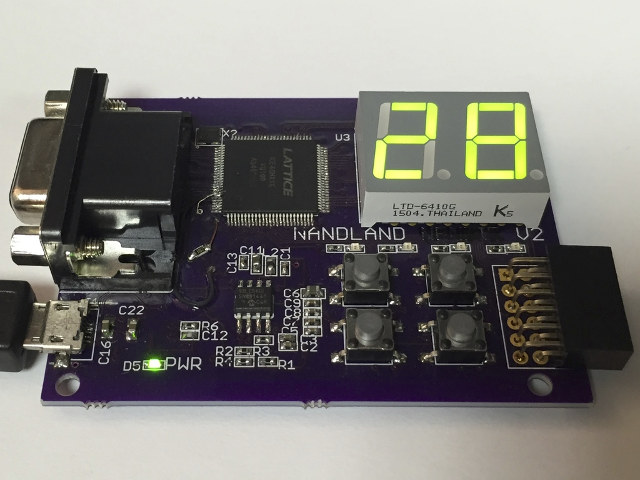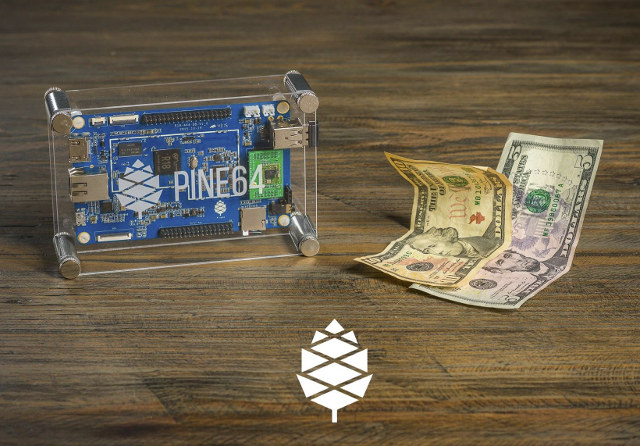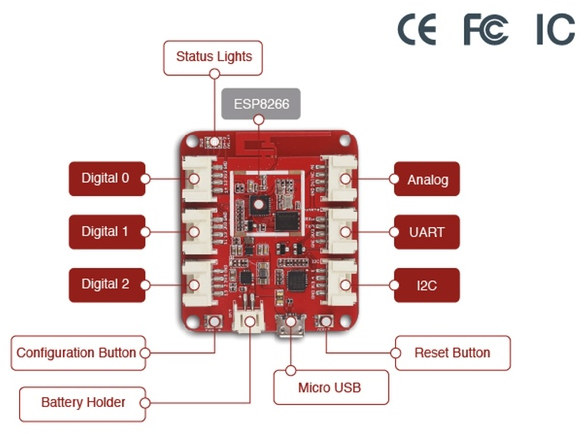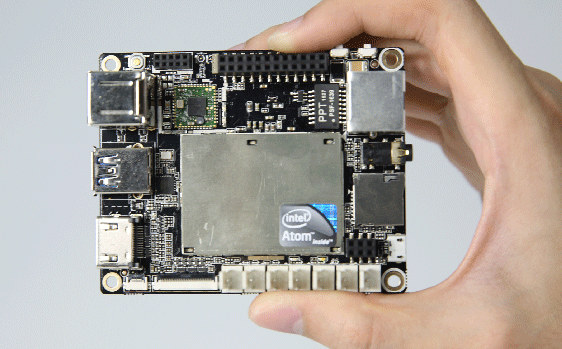FTDI found out that the original Arduino UNO R3 boards had issues handling higher loads with 9V and 12V power input being limited to about 800mA and 300mA respectively before the voltage of the 5V regulator drops, so they decided to make their own supporting up to 1A. NerO board specifications: MCU – Atmel ATMega328 MCU @ 16MHz with Optiboot bootloader I/Os 14 Digital I/O Pins including 6 PWM outputs 6 Analog Inputs USB – micro USB port for programming using FTDI FT231XS USB UART interface (4) Misc – Status and PWR LEDs, on/off switch Power Supply – 7V to 20V ( 9V or 12V recommended ) via power barrel or VIN pin. 5V switching regulator. Dimensions – UNO R3 form factor FCC/CE certified The board is manufactured in Europe by MikroElektronika, a company which I started the hear about more and more, especially since they’ve launched their mikroBUS standard […]
ODROID-C0 Board is an Upcoming Alternative to Raspberry Pi Zero
When Raspberry Pi Zero launched at the end of November, it looked somewhat familiar to Hardkernel ODROID-W board that eventually had to be phased out as Broadcom would not sell Broadcom BCM2835 to the Korean company. In an interesting turn of events, Hardkernel has now shown the first prototype of ODROID-C0 (ODROID-C Zero), a tiny board based on Amlogic S805 found in ODROID-C1+. The name of the board may seem to be derived from Raspberry Pi Zero, but it’s not quite the case as Hardkernel first revealed their plans for ODROID-C0 back in November, a week before R-Pi Zero board was unveiled. ODROID-C0 will have similar specifications to ODROID-C1+ minus Ethernet, and the USB ports in order to reduce the PCB size: SoC – Amlogic S805 quad core Cortex-A5 processor with a Mali-450MP2 GPU System Memory – 1GB DDR3 Storage – eMMC module socket, and micro SD slot Video & […]
GoWarrior Tiger Development Board with ALi M3733 SoC To Support Android, Debian and FreeRTOS
There was a time when development boards were really hard to get for individuals with companies not wanting to waste their time with hobbyists, but the maker revolution changed all that, and now many companies want to get involved in “open source” board for the developer’s community. The latest board trying to emulate the Raspberry Pi is GoWarrior Tiger powered by ALi M3733 dual core cortex A9 processor with 1GB RAM, 4GB Flash, Ethernet and WiFi, HDMI and AV output, and two 40-pin expansion headers. Tiger board specifications: SoC – ALi M3733-AFAAA dual Cortex A9 processor @ 1.0 GHz with ARM Mali-400 MP2 GPU System Memory – 1GB DDR3; dual channel 1600 MT/s, 800MHz Storage – 4GB on-board NAND Flash + micro SD slot Video & Audio Output – HDMI 1.4 port up to 1080p, with support for HDCP and CEC, 3.5 mm AV jack Connectivity – 10/100M Ethernet, 802.11 […]
PINE A64 Development Board Kickstarter Campaign is Up
As previously announced, PINE64 $15 64-bit ARM Linux computer was due to launch on December 9, and the Kickstarter campaign is now up, and the shipping costs are $7 to the US, and $12 to the rest of the world. The name have changed to PINE A64 and PINE A64+ since the first announcement, but the specifications have mostly not changed for th two boards with an Allwinner quad core Cortex A53 processor, 512MB to 1GB RAM, a micro SD slot for storage, Gigabit Ethernet, HDMI 1.4, USB ports, and some other expansion headers for I/Os, displays or cameras. The PINE A64+ however now has an option for 2GB for $29, and we’ve got a bit more information about optional modules and accessories: Wireless module with WiFi and Bluetooth adapter Zwave adapter 7″ LCD touchpanel (PINE64+ only) Dry contact I/O board 5MP MIPI CSI camera Various sensors Various remote controls […]
Nandland Go Board is a $50 Board for Learning FPGA, VHDL & Verilog Programming (Crowdfunding)
There are many FPGA boards on the market at various price points, but many assume you already have the technical knowledge to program the bard with Verilog or VHDL, and may not be suited to beginners. Nandland Go Board is a $50 board that targets beginners with tutorials to get started with blinking LEDs, controlling buttons, received data through the UART interface, showing display patterns via the VGA interface and more. Go Board specifications: FPGA – Lattice ICE40 HX1K with 1280 logic cells, 64Kbit RAM, and one PLL. Storage – 1Mb flash Clock – 25 MHz on-board clock Video Output – VGA Connector Display – Dual 7-Segment LED Display USB – 1x micro USB connector for power, communication, and programming Expansion – PMOD connector Misc – 4x user LEDs, 4x push buttons Power – 5V via micro USB port Dimensions – N/A The board will be programmed using Lattice Semi […]
$15 PINE64 64-Bit ARM Single Board Computer is Powered by Allwinner R18 Processor (Crowdfunding)
It looks like Next Things’ C.H.I.P computer with Allwinner R8 processor will soon have a big brother with PINE A64 board powered by Allwinner R18 / A64 quad core Cortex A53 processor, and made by a US start-up also called PINE 64. PINE A64 and PINE A64+, a version with more memory and features, will have the following specifications: SoC – Allwinner R18 (based on Allwinner A64?) quad core ARM Cortex A53 processor @ 1.2 GHz with Mali-400MP2 GPU System Memory PINE64 – 512 MB DDR3 PINE64+ – 1 GB DDR3 Storage – micro SD slot supporting up to 256 GB Video Output HDMI 1.4 up to 4K resolution @ 30 Hz PINE64+ only – 4-lane MIPI DSI connector and touch panel connector Video Codecs – H.265 up to 4K Audio – HDMI, 3.5 mm headphone jack Connectivity PINE64 – Fast Ethernet + optional WiFi & Bluetooth module PINE64+ – […]
Wio Link is an ESP8266 Board Designed to Make IoT Projects Easier (Crowdfunding)
There are already plenty of board or modules based on Espressif ESP8266 WiFi SoC, but if you don’t like soldering, or would rather avoid breadboards and some cables for your or your kids’ projects, Wio Link may be interesting, as all you need to is to connect Grove modules required for your applications to get started, and Seeed Studio also took care of the low level software part and a drag-and-drop mobile app is provided, so software programming has been made easy too. Wio Link hardware specifications: SoC – Espressif ESP8266EX Tensila SoC Storage – 4MB flash Connectivity – 802.11b/g/n WiFi, with WEP/TKIP/AES encryption support Expansion – 6x Grove connectors: 3x digital, 1x analog, 1x UART and 1x I2C (3.3V I/Os) Power Supply 5V via micro USB port 3.4 ~ 4.2V via external battery Output DC Current – 1000mA MAX Charge Current: 500mA MAX Dimensions – 55mm*48mm Weight – 26g […]
LattePanda is a $79 Arduino Compatible Intel Atom x5 Board Running Windows 10 (Crowdfunding)
I feel like I’m living in another world after writing a title combining Arduino, Intel and Windows 10, but that’s exactly what LattePanda is promising with a development board featuring both an Intel Atom x5-Z8300 processor and an Atmel AVR MCU, and Windows 10 as the operating system. LattePanda board specifications: SoC – Intel Atom x5-Z8300 “Cherry Trail” quad core processor @ 1.44 GHz (Burst frequency: 1.84 GHz) with Intel Gen8 HD graphics @ 500 MHz System Memory – 2 to 4 GB DDR3L Storage – 32 or 64 GB eMMC, micro SD slot MCU – Atmel Atmega32u4 micro-controller Video Output / Display – HDMI, and MIPID DSI connector Audio I/O – HDMI, 3.5mm audio port Connectivity – Ethernet, WiFi and Bluetooth 4.0 USB – 1x USB 3.0 port, 2x USB 2.0 host ports, 1x micro USB port for power Serial – 1x from Intel SoC, 1x from Atmel MCU […]


